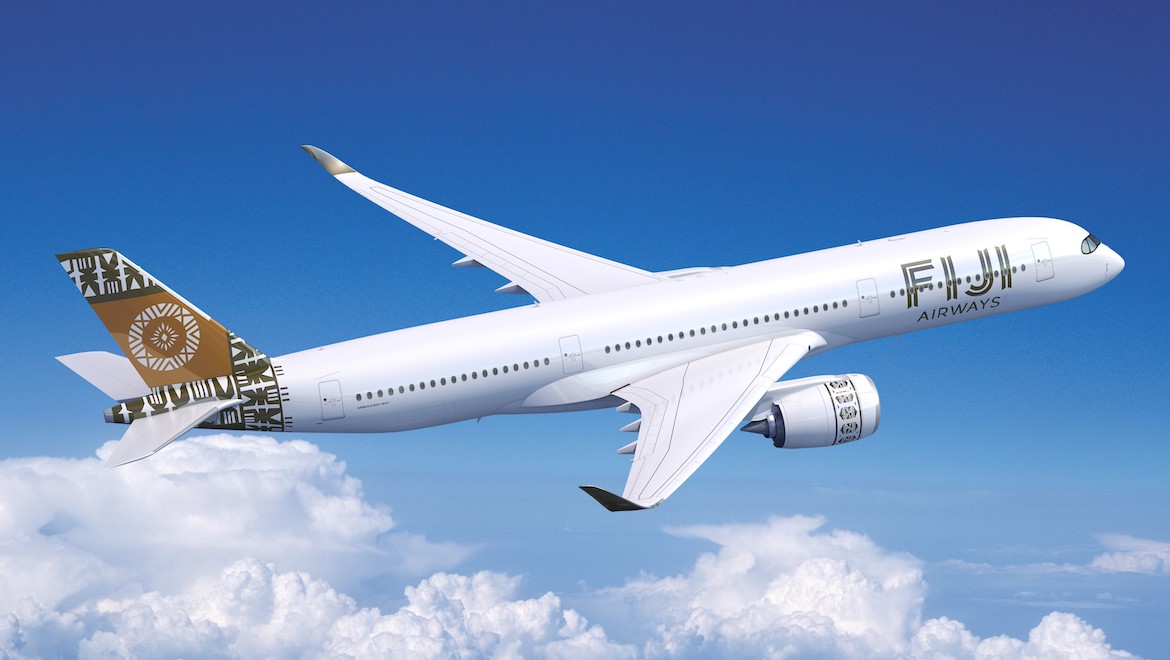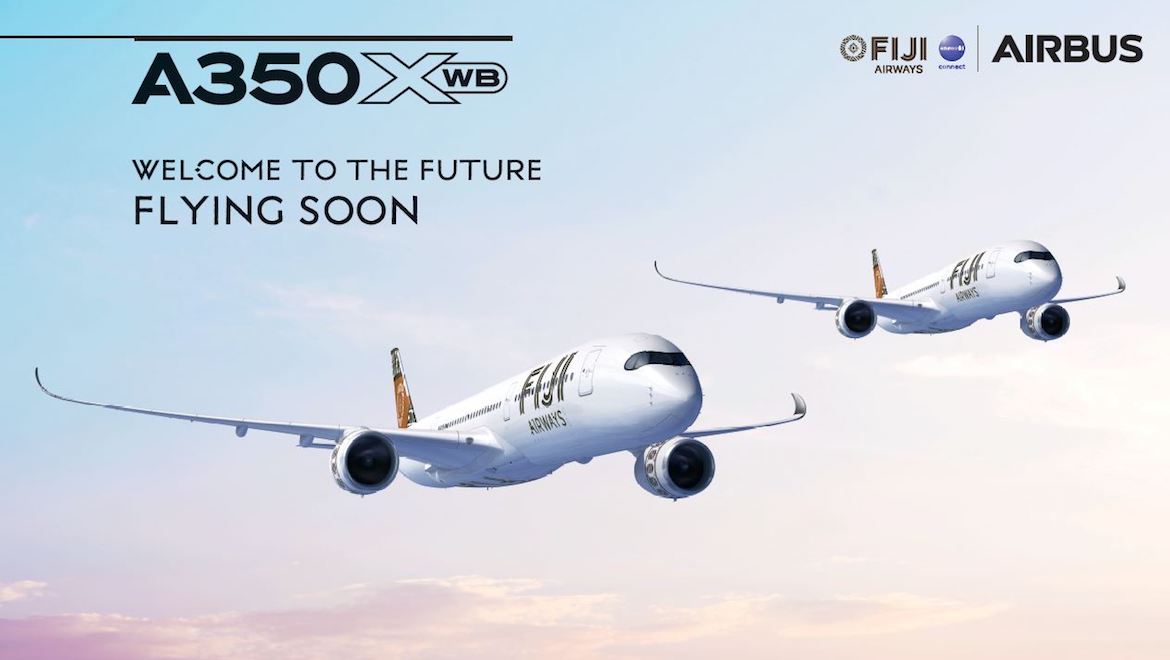
Fiji Airways will become the first Airbus A350 operator in the South Pacific after announcing an order for two of the next generation widebody aircraft.
The airline said on Thursday it would add two A350-900s to its fleet, with the aircraft scheduled to arrive in November and December 2019.
The A350-900s were expected to be deployed on Fiji Airways’ services to the United States and Australia, as well as potentially open additional routes. The exact routes and schedules would be announced closer to the A350-900s’ arrival in the fleet, Fiji Airways said.
“Ultimately, a luxury, world-class destination, like Fiji, deserves a luxury, world-class travel experience and that’s exactly what these aircraft will deliver,” Fiji Airways chief executive Andre Viljoen said in a statement.
“For our guests, the holiday starts the moment they board the aircraft.”
Currently, Fiji Airways flies to three destinations in the United States – Honolulu, Los Angeles and San Francisco.
Meanwhile, it serves four Australian ports – Adelaide, Brisbane, Melbourne and Sydney – from its Nadi hub with a mixture of mixture of Boeing 737 and Airbus A330 equipment. The airline also flies between Suva and Sydney.
In recent years, Fiji Airways has been keen to attract Australians heading to the United States to consider a one-stop option via Nadi.
To that end, the airline has bulked up its Australian network by adding Adelaide in June 2017 and boosting its presence in the key markets of Brisbane, Melbourne and Sydney.
Fiji Airways said the two A350-900s would be leased from Dubai Aerospace Enterprise (DAE) Capital and would be configured to carry 334 passengers in a two-class layout featuring 33 B/E Aerospace Super Diamond business class seats that offer direct aisle access for every passenger and 301 Recaro CL3710 economy class seats.
The airline said the A350-900s would compliment its current widebody fleet of five A330-200s and one A330-300. Two A330-200s were picked up in 2018 on short term leases while the airline evaluated its future long-haul aircraft needs.
The A330 shares a common type rating with the A350. Pilots qualified and current on the A330 would be able to fly the A350 by taking a “differences training” course, Airbus said, resulting in significant cost savings and operational flexibility.
While Fiji Airways is the first airline in the South Pacific to order the A350 in the South Pacific, the aircraft is a regular presence at a number of Australian and New Zealand airports, with the likes of Cathay Pacific, Malaysia Airlines, Singapore Airlines, Thai Airways and Qatar Airways operating the type to this part of the world.
“We are truly proud to see Fiji Airways’ eye-catching livery on our A350 XWB which will make it the launch carrier from the South Pacific region,” Airbus chief commercial officer Christian Scherer said in a statement.
“We also congratulate DAE Capital on becoming the newest Airbus customer to recognise the A350 – the only new high capacity intercontinental aircraft in the world – hardly surprising as its fuel efficiency, sustainability and passenger comfort are simply unmatched.”
The A350 has received 890 firm orders from 50 customers at March 31 2019, according to figures from Airbus. [vc_gallery interval=”0″ images=”53074,67762,51729,50164,57123,48659″ img_size=”750×420″ title=”Airlines with Airbus A350 operations in Australia and New Zealand “]
Profit fell in 2018 due to higher fuel prices
Fiji Airways’ order for two A350-900s was announced on a day the airline reported a near halving of profit in calendar 2018 because of higher fuel prices and currency movements and a “challenging” outlook for the current year.
The company said group profit before tax for the 12 months to December 31 2018 was F$55.3 million (A$36.6 million), compared with F$95.8 million (A$63.5 million) in the prior corresponding period.
Fiji Airways said fuel prices rose 28 per cent in the year, which resulted in a F$31.5 million impact on the bottom line. Meanwhile, foreign exchange valuations impacted profits by a further F$8.2 million.
Revenue was up 10 per cent to F$1.02 billion, from F$929 million in the prior year. It was the first time the company had posted annual revenues in excess of F$1 billion.
Viljoen said 2018 was a year of highs and lows. While the start of new routes such as Nadi-Tokyo Narita had supported an increase in annual passenger numbers to 1.7 million, from 1.6 million previously, the airline has also had to contend with rising fuel prices and increased costs.
“Our network and fleet size grew, which means our manpower requirements grew as well, contributing to increased cost,” Viljoen said.
“Despite these and other industry wide challenges, our team responded by diligently managing cost where possible and continuing with our infrastructure and fleet investment strategy.”
Looking ahead, Viljoen said fuel prices were expected to have a F$40 million impact in calendar 2019, “hence the need to invest in modern, fuel efficient aircraft that aligns with our commitment to providing a world-class travel experience”.
“The outlook for 2019 remains challenging,” Viljoen said.
“Our team stands ready to navigate these challenges, maintaining sound fiscal discipline and a relentless focus on customer experience.”
All eligible non-management staff of Fiji Airways and Fiji Link will be entitled to a profit-share payout of F$2,350.
While Fiji Airways is majority government owned, Qantas holds 46 per cent of the airline, while Air New Zealand has about two per cent. The governments of Kiribati, Tonga, Samoa and Nauru also each have a small stake in the airline formerly known as Air Pacific.





